In Pursuit of Simple, Ordinary Justice: A Critique of the US Criminal Justice System
VerifiedAdded on 2023/06/08
|6
|1456
|136
AI Summary
The article critiques the US criminal justice system, focusing on the prison system and the role of counsel. The author provides statistics and insights on the flaws and biases in the system. The article argues that the US prison system is the most vile, deprived, and racist element of the criminal justice system. It also highlights the growing number of for-profit sectors that benefit from the prison population. The article further argues that the role of counsel is crucial in reforming the criminal justice system. The author provides own experience working at Public Defender Service (PDS) and believes that one lawyer can accomplish great things in ensuring that justice is served towards promoting justice in the criminal law.
Contribute Materials
Your contribution can guide someone’s learning journey. Share your
documents today.
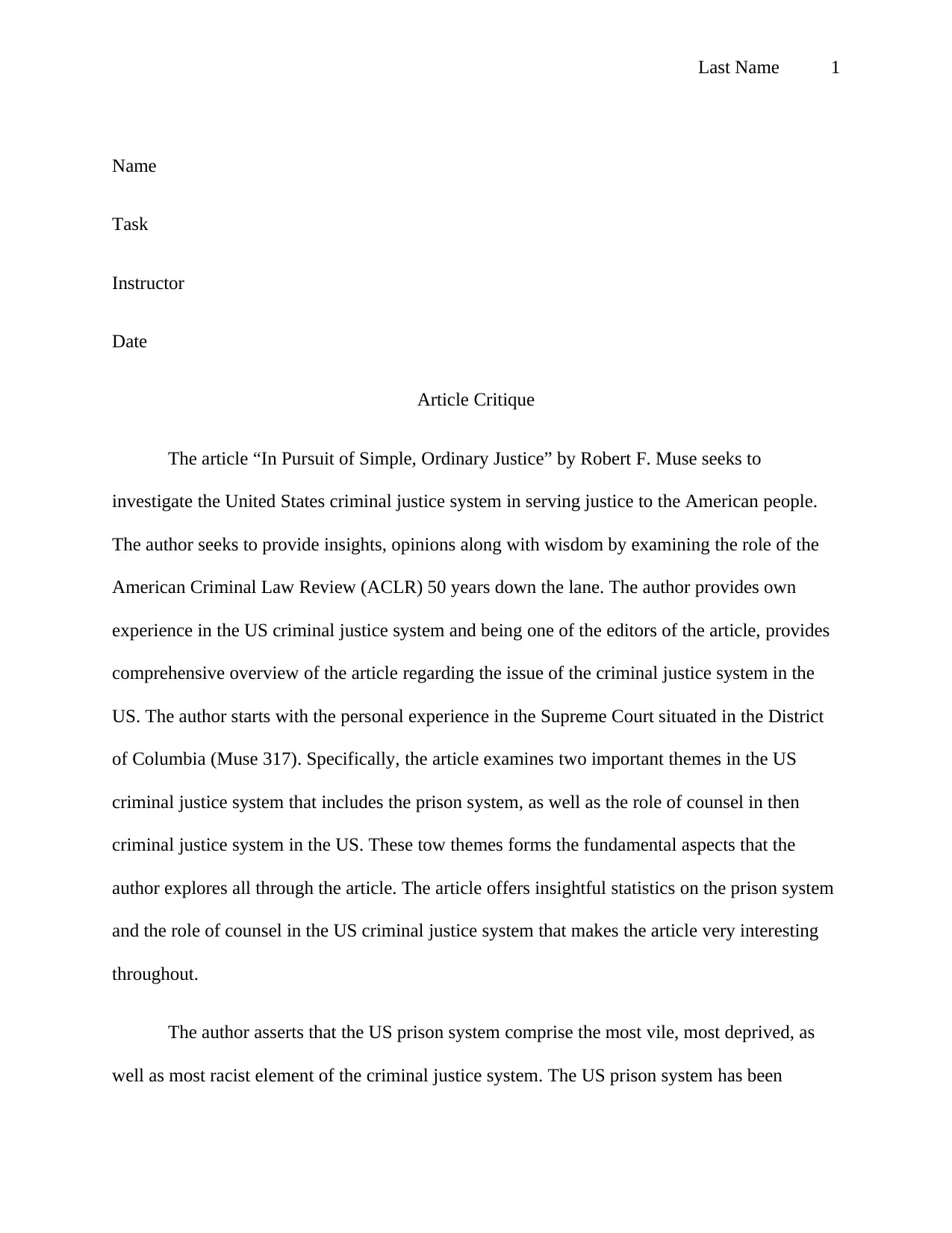
Last Name 1
Name
Task
Instructor
Date
Article Critique
The article “In Pursuit of Simple, Ordinary Justice” by Robert F. Muse seeks to
investigate the United States criminal justice system in serving justice to the American people.
The author seeks to provide insights, opinions along with wisdom by examining the role of the
American Criminal Law Review (ACLR) 50 years down the lane. The author provides own
experience in the US criminal justice system and being one of the editors of the article, provides
comprehensive overview of the article regarding the issue of the criminal justice system in the
US. The author starts with the personal experience in the Supreme Court situated in the District
of Columbia (Muse 317). Specifically, the article examines two important themes in the US
criminal justice system that includes the prison system, as well as the role of counsel in then
criminal justice system in the US. These tow themes forms the fundamental aspects that the
author explores all through the article. The article offers insightful statistics on the prison system
and the role of counsel in the US criminal justice system that makes the article very interesting
throughout.
The author asserts that the US prison system comprise the most vile, most deprived, as
well as most racist element of the criminal justice system. The US prison system has been
Name
Task
Instructor
Date
Article Critique
The article “In Pursuit of Simple, Ordinary Justice” by Robert F. Muse seeks to
investigate the United States criminal justice system in serving justice to the American people.
The author seeks to provide insights, opinions along with wisdom by examining the role of the
American Criminal Law Review (ACLR) 50 years down the lane. The author provides own
experience in the US criminal justice system and being one of the editors of the article, provides
comprehensive overview of the article regarding the issue of the criminal justice system in the
US. The author starts with the personal experience in the Supreme Court situated in the District
of Columbia (Muse 317). Specifically, the article examines two important themes in the US
criminal justice system that includes the prison system, as well as the role of counsel in then
criminal justice system in the US. These tow themes forms the fundamental aspects that the
author explores all through the article. The article offers insightful statistics on the prison system
and the role of counsel in the US criminal justice system that makes the article very interesting
throughout.
The author asserts that the US prison system comprise the most vile, most deprived, as
well as most racist element of the criminal justice system. The US prison system has been
Secure Best Marks with AI Grader
Need help grading? Try our AI Grader for instant feedback on your assignments.
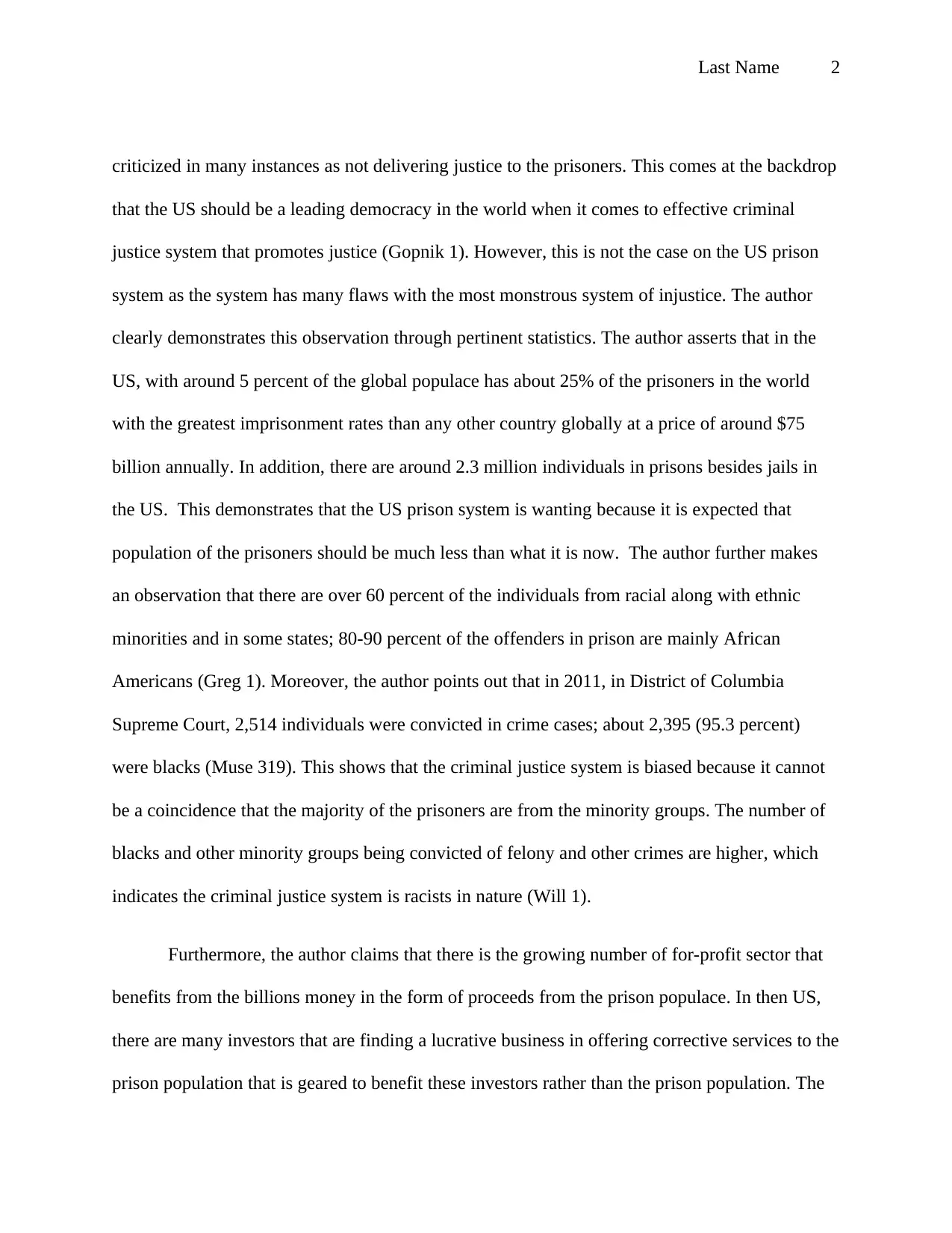
Last Name 2
criticized in many instances as not delivering justice to the prisoners. This comes at the backdrop
that the US should be a leading democracy in the world when it comes to effective criminal
justice system that promotes justice (Gopnik 1). However, this is not the case on the US prison
system as the system has many flaws with the most monstrous system of injustice. The author
clearly demonstrates this observation through pertinent statistics. The author asserts that in the
US, with around 5 percent of the global populace has about 25% of the prisoners in the world
with the greatest imprisonment rates than any other country globally at a price of around $75
billion annually. In addition, there are around 2.3 million individuals in prisons besides jails in
the US. This demonstrates that the US prison system is wanting because it is expected that
population of the prisoners should be much less than what it is now. The author further makes
an observation that there are over 60 percent of the individuals from racial along with ethnic
minorities and in some states; 80-90 percent of the offenders in prison are mainly African
Americans (Greg 1). Moreover, the author points out that in 2011, in District of Columbia
Supreme Court, 2,514 individuals were convicted in crime cases; about 2,395 (95.3 percent)
were blacks (Muse 319). This shows that the criminal justice system is biased because it cannot
be a coincidence that the majority of the prisoners are from the minority groups. The number of
blacks and other minority groups being convicted of felony and other crimes are higher, which
indicates the criminal justice system is racists in nature (Will 1).
Furthermore, the author claims that there is the growing number of for-profit sector that
benefits from the billions money in the form of proceeds from the prison populace. In then US,
there are many investors that are finding a lucrative business in offering corrective services to the
prison population that is geared to benefit these investors rather than the prison population. The
criticized in many instances as not delivering justice to the prisoners. This comes at the backdrop
that the US should be a leading democracy in the world when it comes to effective criminal
justice system that promotes justice (Gopnik 1). However, this is not the case on the US prison
system as the system has many flaws with the most monstrous system of injustice. The author
clearly demonstrates this observation through pertinent statistics. The author asserts that in the
US, with around 5 percent of the global populace has about 25% of the prisoners in the world
with the greatest imprisonment rates than any other country globally at a price of around $75
billion annually. In addition, there are around 2.3 million individuals in prisons besides jails in
the US. This demonstrates that the US prison system is wanting because it is expected that
population of the prisoners should be much less than what it is now. The author further makes
an observation that there are over 60 percent of the individuals from racial along with ethnic
minorities and in some states; 80-90 percent of the offenders in prison are mainly African
Americans (Greg 1). Moreover, the author points out that in 2011, in District of Columbia
Supreme Court, 2,514 individuals were convicted in crime cases; about 2,395 (95.3 percent)
were blacks (Muse 319). This shows that the criminal justice system is biased because it cannot
be a coincidence that the majority of the prisoners are from the minority groups. The number of
blacks and other minority groups being convicted of felony and other crimes are higher, which
indicates the criminal justice system is racists in nature (Will 1).
Furthermore, the author claims that there is the growing number of for-profit sector that
benefits from the billions money in the form of proceeds from the prison populace. In then US,
there are many investors that are finding a lucrative business in offering corrective services to the
prison population that is geared to benefit these investors rather than the prison population. The
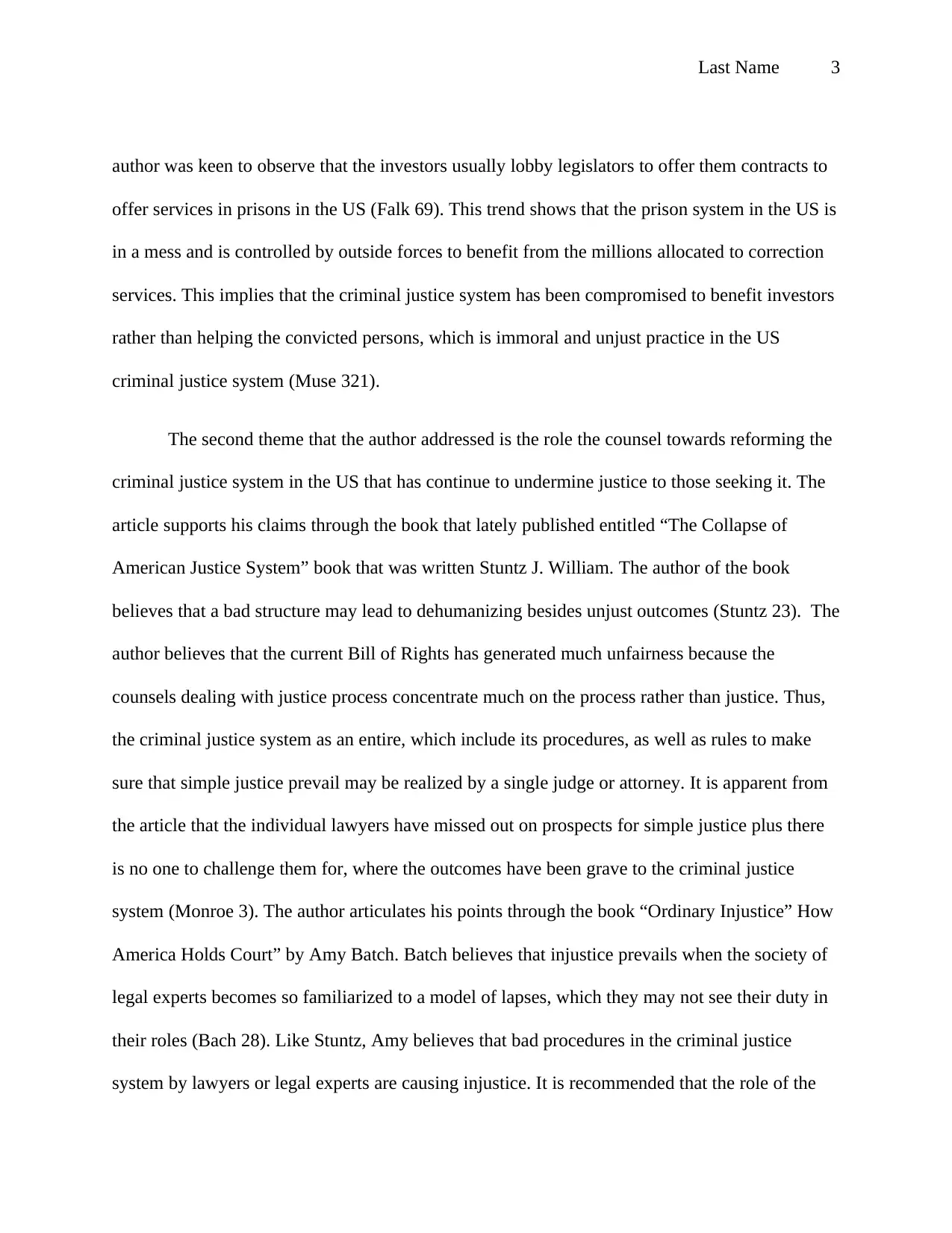
Last Name 3
author was keen to observe that the investors usually lobby legislators to offer them contracts to
offer services in prisons in the US (Falk 69). This trend shows that the prison system in the US is
in a mess and is controlled by outside forces to benefit from the millions allocated to correction
services. This implies that the criminal justice system has been compromised to benefit investors
rather than helping the convicted persons, which is immoral and unjust practice in the US
criminal justice system (Muse 321).
The second theme that the author addressed is the role the counsel towards reforming the
criminal justice system in the US that has continue to undermine justice to those seeking it. The
article supports his claims through the book that lately published entitled “The Collapse of
American Justice System” book that was written Stuntz J. William. The author of the book
believes that a bad structure may lead to dehumanizing besides unjust outcomes (Stuntz 23). The
author believes that the current Bill of Rights has generated much unfairness because the
counsels dealing with justice process concentrate much on the process rather than justice. Thus,
the criminal justice system as an entire, which include its procedures, as well as rules to make
sure that simple justice prevail may be realized by a single judge or attorney. It is apparent from
the article that the individual lawyers have missed out on prospects for simple justice plus there
is no one to challenge them for, where the outcomes have been grave to the criminal justice
system (Monroe 3). The author articulates his points through the book “Ordinary Injustice” How
America Holds Court” by Amy Batch. Batch believes that injustice prevails when the society of
legal experts becomes so familiarized to a model of lapses, which they may not see their duty in
their roles (Bach 28). Like Stuntz, Amy believes that bad procedures in the criminal justice
system by lawyers or legal experts are causing injustice. It is recommended that the role of the
author was keen to observe that the investors usually lobby legislators to offer them contracts to
offer services in prisons in the US (Falk 69). This trend shows that the prison system in the US is
in a mess and is controlled by outside forces to benefit from the millions allocated to correction
services. This implies that the criminal justice system has been compromised to benefit investors
rather than helping the convicted persons, which is immoral and unjust practice in the US
criminal justice system (Muse 321).
The second theme that the author addressed is the role the counsel towards reforming the
criminal justice system in the US that has continue to undermine justice to those seeking it. The
article supports his claims through the book that lately published entitled “The Collapse of
American Justice System” book that was written Stuntz J. William. The author of the book
believes that a bad structure may lead to dehumanizing besides unjust outcomes (Stuntz 23). The
author believes that the current Bill of Rights has generated much unfairness because the
counsels dealing with justice process concentrate much on the process rather than justice. Thus,
the criminal justice system as an entire, which include its procedures, as well as rules to make
sure that simple justice prevail may be realized by a single judge or attorney. It is apparent from
the article that the individual lawyers have missed out on prospects for simple justice plus there
is no one to challenge them for, where the outcomes have been grave to the criminal justice
system (Monroe 3). The author articulates his points through the book “Ordinary Injustice” How
America Holds Court” by Amy Batch. Batch believes that injustice prevails when the society of
legal experts becomes so familiarized to a model of lapses, which they may not see their duty in
their roles (Bach 28). Like Stuntz, Amy believes that bad procedures in the criminal justice
system by lawyers or legal experts are causing injustice. It is recommended that the role of the
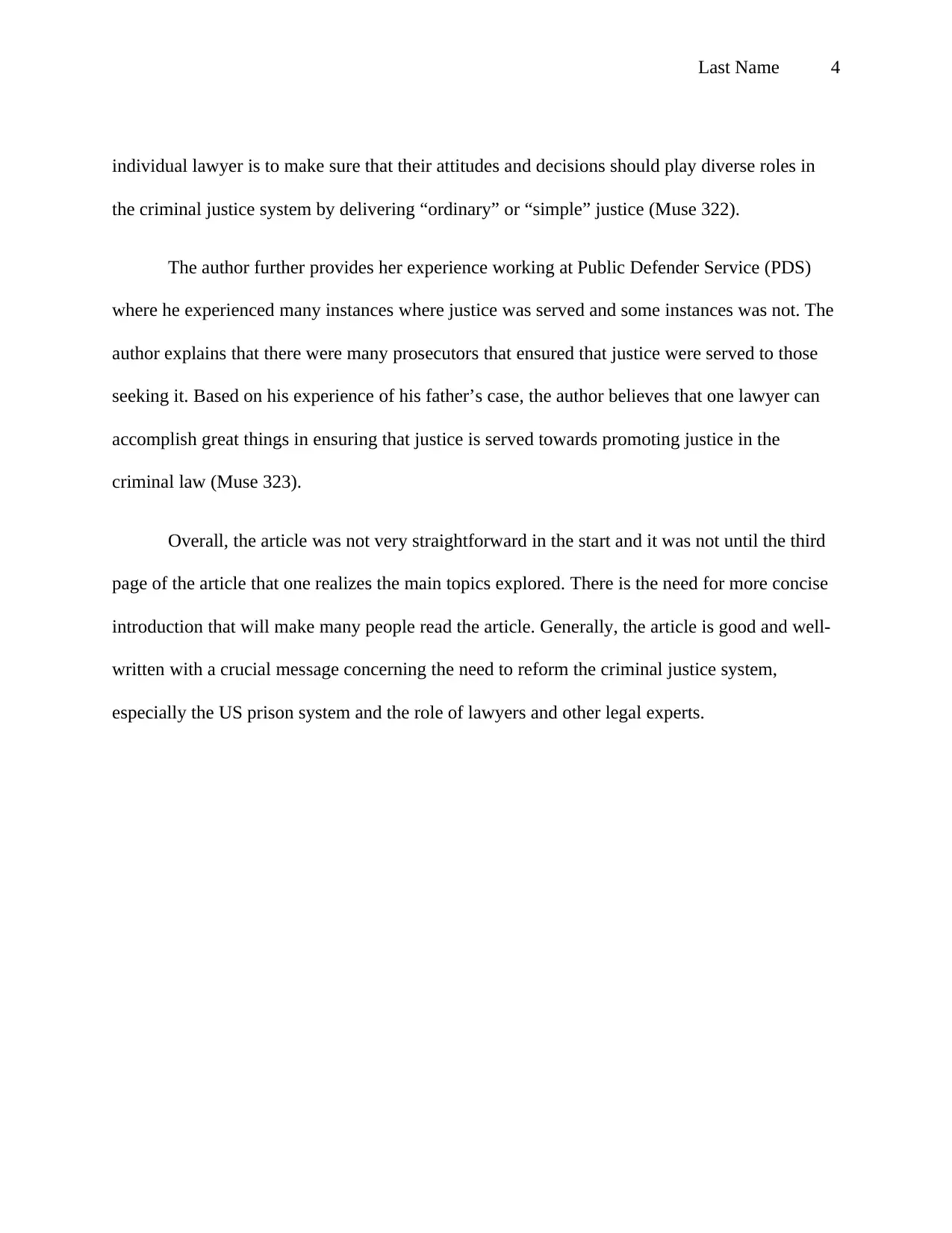
Last Name 4
individual lawyer is to make sure that their attitudes and decisions should play diverse roles in
the criminal justice system by delivering “ordinary” or “simple” justice (Muse 322).
The author further provides her experience working at Public Defender Service (PDS)
where he experienced many instances where justice was served and some instances was not. The
author explains that there were many prosecutors that ensured that justice were served to those
seeking it. Based on his experience of his father’s case, the author believes that one lawyer can
accomplish great things in ensuring that justice is served towards promoting justice in the
criminal law (Muse 323).
Overall, the article was not very straightforward in the start and it was not until the third
page of the article that one realizes the main topics explored. There is the need for more concise
introduction that will make many people read the article. Generally, the article is good and well-
written with a crucial message concerning the need to reform the criminal justice system,
especially the US prison system and the role of lawyers and other legal experts.
individual lawyer is to make sure that their attitudes and decisions should play diverse roles in
the criminal justice system by delivering “ordinary” or “simple” justice (Muse 322).
The author further provides her experience working at Public Defender Service (PDS)
where he experienced many instances where justice was served and some instances was not. The
author explains that there were many prosecutors that ensured that justice were served to those
seeking it. Based on his experience of his father’s case, the author believes that one lawyer can
accomplish great things in ensuring that justice is served towards promoting justice in the
criminal law (Muse 323).
Overall, the article was not very straightforward in the start and it was not until the third
page of the article that one realizes the main topics explored. There is the need for more concise
introduction that will make many people read the article. Generally, the article is good and well-
written with a crucial message concerning the need to reform the criminal justice system,
especially the US prison system and the role of lawyers and other legal experts.
Secure Best Marks with AI Grader
Need help grading? Try our AI Grader for instant feedback on your assignments.
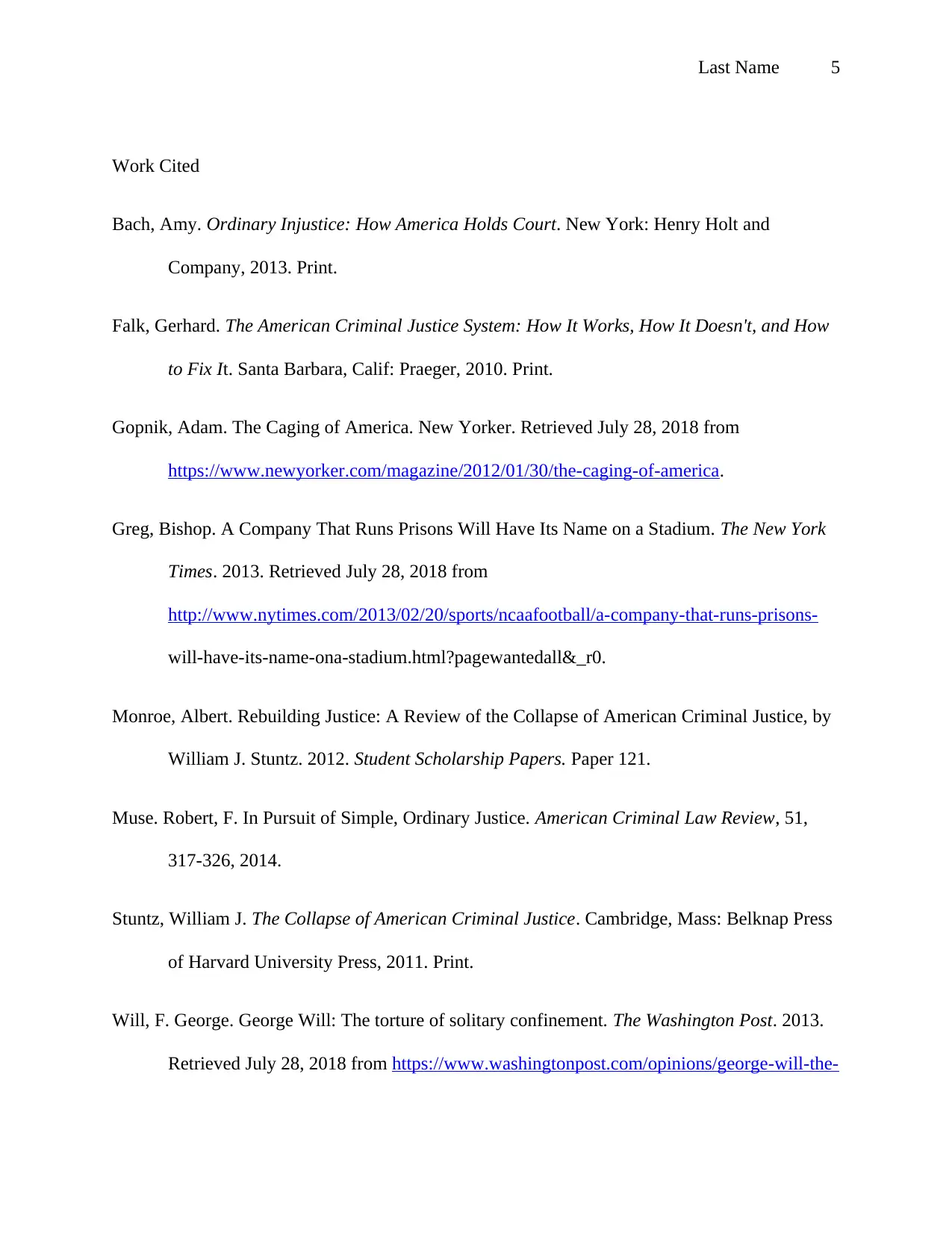
Last Name 5
Work Cited
Bach, Amy. Ordinary Injustice: How America Holds Court. New York: Henry Holt and
Company, 2013. Print.
Falk, Gerhard. The American Criminal Justice System: How It Works, How It Doesn't, and How
to Fix It. Santa Barbara, Calif: Praeger, 2010. Print.
Gopnik, Adam. The Caging of America. New Yorker. Retrieved July 28, 2018 from
https://www.newyorker.com/magazine/2012/01/30/the-caging-of-america.
Greg, Bishop. A Company That Runs Prisons Will Have Its Name on a Stadium. The New York
Times. 2013. Retrieved July 28, 2018 from
http://www.nytimes.com/2013/02/20/sports/ncaafootball/a-company-that-runs-prisons-
will-have-its-name-ona-stadium.html?pagewantedall&_r0.
Monroe, Albert. Rebuilding Justice: A Review of the Collapse of American Criminal Justice, by
William J. Stuntz. 2012. Student Scholarship Papers. Paper 121.
Muse. Robert, F. In Pursuit of Simple, Ordinary Justice. American Criminal Law Review, 51,
317-326, 2014.
Stuntz, William J. The Collapse of American Criminal Justice. Cambridge, Mass: Belknap Press
of Harvard University Press, 2011. Print.
Will, F. George. George Will: The torture of solitary confinement. The Washington Post. 2013.
Retrieved July 28, 2018 from https://www.washingtonpost.com/opinions/george-will-the-
Work Cited
Bach, Amy. Ordinary Injustice: How America Holds Court. New York: Henry Holt and
Company, 2013. Print.
Falk, Gerhard. The American Criminal Justice System: How It Works, How It Doesn't, and How
to Fix It. Santa Barbara, Calif: Praeger, 2010. Print.
Gopnik, Adam. The Caging of America. New Yorker. Retrieved July 28, 2018 from
https://www.newyorker.com/magazine/2012/01/30/the-caging-of-america.
Greg, Bishop. A Company That Runs Prisons Will Have Its Name on a Stadium. The New York
Times. 2013. Retrieved July 28, 2018 from
http://www.nytimes.com/2013/02/20/sports/ncaafootball/a-company-that-runs-prisons-
will-have-its-name-ona-stadium.html?pagewantedall&_r0.
Monroe, Albert. Rebuilding Justice: A Review of the Collapse of American Criminal Justice, by
William J. Stuntz. 2012. Student Scholarship Papers. Paper 121.
Muse. Robert, F. In Pursuit of Simple, Ordinary Justice. American Criminal Law Review, 51,
317-326, 2014.
Stuntz, William J. The Collapse of American Criminal Justice. Cambridge, Mass: Belknap Press
of Harvard University Press, 2011. Print.
Will, F. George. George Will: The torture of solitary confinement. The Washington Post. 2013.
Retrieved July 28, 2018 from https://www.washingtonpost.com/opinions/george-will-the-

Last Name 6
torture of-solitary-confinement/2013/02/20/ae115d74-7ac9-11e2-9a75
dab0201670da_story.html?utm_term=.903e929f03ba.
torture of-solitary-confinement/2013/02/20/ae115d74-7ac9-11e2-9a75
dab0201670da_story.html?utm_term=.903e929f03ba.
1 out of 6
Related Documents
Your All-in-One AI-Powered Toolkit for Academic Success.
+13062052269
info@desklib.com
Available 24*7 on WhatsApp / Email
![[object Object]](/_next/static/media/star-bottom.7253800d.svg)
Unlock your academic potential
© 2024 | Zucol Services PVT LTD | All rights reserved.



